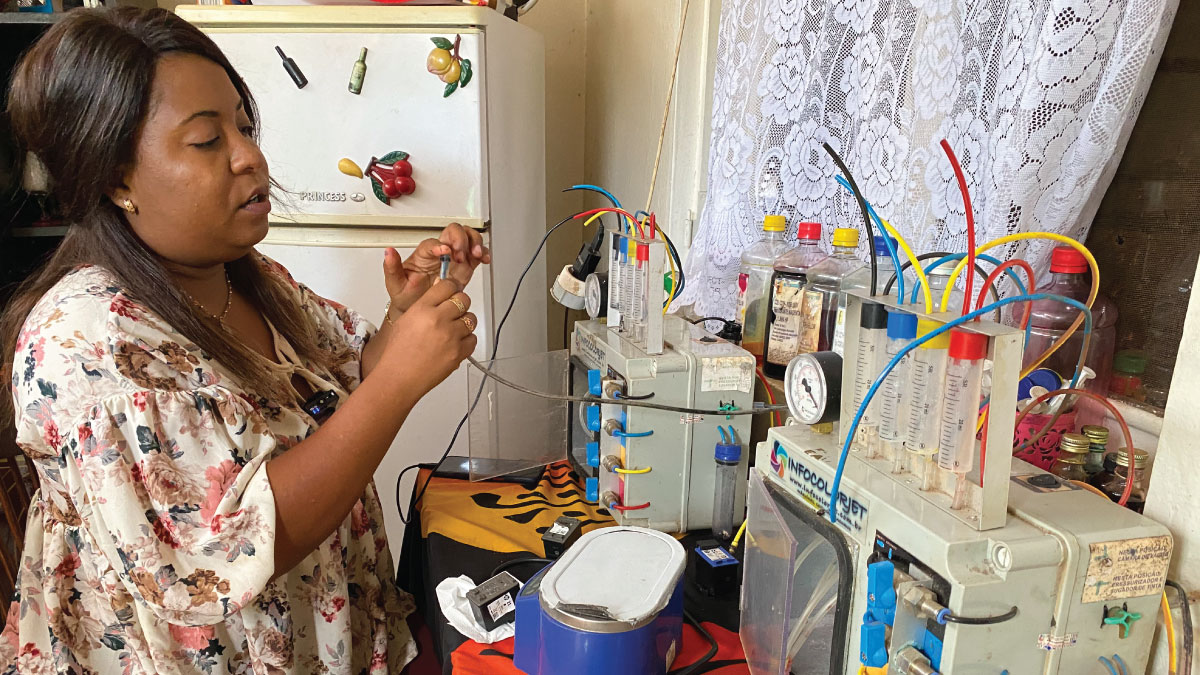As countries seek to recover from the COVID-19 pandemic, a young businesswoman in Guinea-Bissau is stimulating growth through entrepreneurship.
Jackline Martins recycles liquid printer cartridges in Guinea-Bissau. Photo courtesy of Ms. Martins.
Jackline Martins runs her own business of recycled liquid printer cartridges from her home kitchen, providing services to public and private companies, schools, universities, as well as individuals in Guinea-Bissau.
In 2018, she established ‘’Ambiental Multicolor” (Environmental Multicolor) as an effort to generate income in an environment-friendly manner. After failing to find a suitable job, she thought of this idea and presented it in an entrepreneurship contest, which she won.
“When I finished my studies, I came here and there was no job and then I heard of a contest, applied, and got the funding”, says 30-year-old Ms. Martins.
“I thought exactly about this business because recycling cartridges is an environment-friendly business. Used cartridges are usually thrown away, and to reduce the amount of solid waste, I came up with this idea of refilling cartridges,’’ she adds.
At UNCTAD’s 15th quadrennial conference (UNCTAD15) held from 3 to 7 October, in which Guinea-Bissau participated, countries examined the priority measures needed to support small business owners like Ms. Martins to facilitate a stronger and more inclusive recovery from the pandemic.
The national economist, Mussaba Canté, underscored the need to support local entrepreneurs like Ms. Martins to boost socioeconomic development in Guinea-Bissau.
Prize winner
Recently, Ms. Martins participated in a United Nations Development Programme (UNDP) entrepreneurship competition to engage young entrepreneurs and quasi-entrepreneurs in developing ideas for the public sector.
She emerged third and won a prize of $1,800 (1,000,000 CFA francs), with which she plans to expand her business by selling computer supplies.
Ms. Martins feels that entrepreneurship “has been growing recently in the country”, especially among youth and women. Despite this growth, she states, “entrepreneurs often face difficulties” such as the lack of financial means.
She believes that Guinea-Bissau should create opportunities to establish new facilities and launch new initiatives for young entrepreneurs. Currently, organizations such as UNDP are promoting entrepreneurship among the youth and women in the country.
Ms. Martins says the UNDP initiative is very helpful and funding is also useful. Yet, there is a need to guide the entrepreneurs on how to use it. “Financing can be useful, but if they don’t know how to apply it, it becomes more complicated.”
She suggests the creation of a platform where entrepreneurs can “write down their daily activities, business flow, cash flow, marketing strategies, and use these tools to follow up with the financing.”
Following her win in the entrepreneurship competition, Ms. Martins is receiving mentorship from UNDP and its partners. They’re closely following her journey, which will later be shared in an event where other youth will be invited, as part of efforts to support and encourage entrepreneurship in Guinea-Bissau.
Expanding labour force, but limited decent employment
Young people comprise more than a third (34.2%) of Africa's population, currently the only region in the world whose labour force is rapidly expanding, according to a report by the International Labour Organization (ILO) entitled “Tackling the youth employment challenge”.
However, decent employment is still a challenge for the continent, especially for the youth and women. In 2019, about 34 million people were unemployed in Africa. Of these, 12.2 million were young people aged 15 to 24.
Entrepreneurship can be a solution for the challenge of decent employment among African youth, including Bissau-Guineans, who represent almost 40% of the country’s population.
According to the ILO’s modelled estimates for 2019, the unemployment rate among Bissau-Guinean youth (15 to 24 years) stands at 4.6%.

